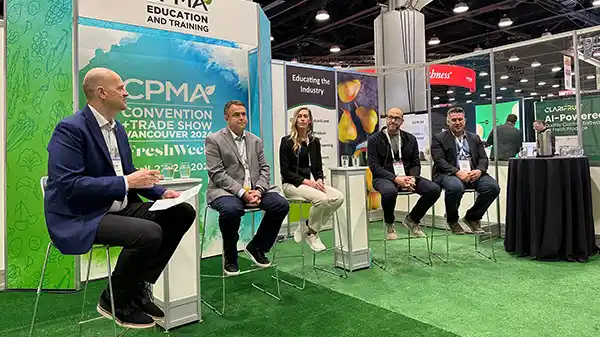VANCOUVER, BC—Food inflation, and how to manage it, is one of the hottest topics for Canadian consumers.
At the Canadian Produce Marketing Association’s convention on April 25, a panel of grocers spanning discount to high end discussed how they’re trying to mitigate some of the higher prices, and help consumers stretch their dollar in the produce department.
Retailers across the panel agreed that consumer trips are up, basket count is down, consumers are shopping multiple channels, and, contrary to trends in the U.S., sales fliers are more popular than ever.
Mimmo Franzone, vice president of merchandising for Longo’s BB #:154544, Vaughn, ON, said the company reacted in a way that most retailers wouldn’t expect.
“Our flier used to be biweekly, but now the consumer wants deals more often,” so, we actually shifted. For 60 years, we had biweekly fliers and now it’s weekly.”
Sierra Johnston, general manger for Pattison Food Group BB #:119039, which operates Save On Foods, Langley, BC, said retailers are seeing noticeable changes in consumer behavior.
“We’re really seeing a heavy shift and consumer shopping fliers and promotional items,” she said. “Our transactions are up, however, people are buying less when they’re shopping.”
At Sobeys, Stellarton, NS, BB #:116615 Tom Pierce, director of supplier development, consumers aren’t sticking to one banner.
“We’re seeing a shift to discount,” he said. “We do have discount banners, so that’s been a bit of a boom for us.”
For a retailer like Save on Foods and Longo’s, which doesn’t have a discount format, pricing strategy has become extremely important.
“We’re making sure we’re the right price on promotion, and the right retail on items on a consumer’s list,” Johnston said.
Franzone said Longo’s is leaning into education and connection with consumers, highlighting how to stretch a dollar and eliminate food waste.
“We continue to drive solution-based programs for our guests, because we’re not in a position where we’re going to be the cheapest on the street,” he said. “We have to think about how do we offer value, and give guests the right product and give them tips on how to continue to eat healthy.”
Jerry Dzikowski of Giant Tiger, Ottawa, ON, is seeing consumers focus on the basics to save money.
“Rather than building their basket on value-added, they might go back to core commodity items,” he said. “With bagged salads being over $5, customers might just go ‘I’ll buy the head lettuce now.’”
And that has buyers looking at alternatives in sourcing he said.
“I might look at a No. 2 potato or I might look at some peppers with blemishes on it because I want to give that customer some value,” he said.
Johnston agreed that retailers are looking at specs, and looking for opportunity buys.
“Can we take some cost down and give them a better value and price,” she said. “We’re working really closely with our supplier partners and looking for chances where they’re long on something, we can help out our supplier and help our customer in turn by getting a really good offer on the street.”
For Sobeys, which has multiple banners, Pierce said he’s working with suppliers to solve problems.
“Can we get a better price because we’re buying the whole tree,” he said. “Because we can buy the top end and all the way down to the discount level.”
Plastic takes a back seat to price
Panelists agreed that sustainability is important to consumers, but price is king right now.
“Sustainability is still important but it’s way down on the list,” Franzone said. “It used to be No. 1 or No. 2, but now it’s No. 8 or No. 9.”
Pierce said retailers are hoping not to have hasty regulations come down from the government.
“This is definitely not the time to add any extra cost because of regulatory issues, for plastics,” he said. “We want to make sure that we go slow and make a better decision.”
The longer food inflation goes on, the less important plastic will be for consumers. “I think that sustainability is important to consumers, but only to a point,” she said. “It becomes less important when they’re worried about higher needs, like housing.”



